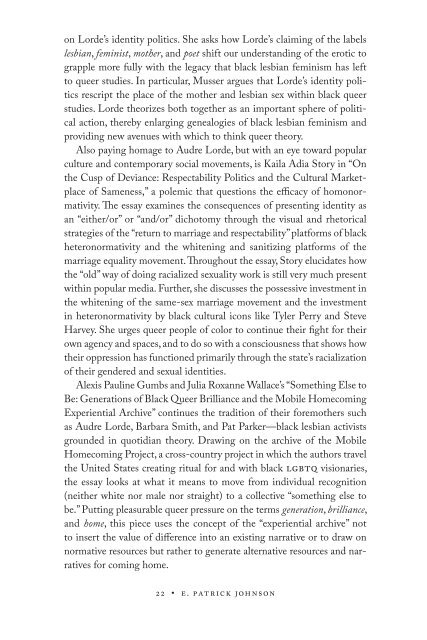No Tea
89AS6wvrf
89AS6wvrf
Create successful ePaper yourself
Turn your PDF publications into a flip-book with our unique Google optimized e-Paper software.
on Lorde’s identity politics. She asks how Lorde’s claiming of the labels<br />
lesbian, feminist, mother, and poet shift our understanding of the erotic to<br />
grapple more fully with the legacy that black lesbian feminism has left<br />
to queer studies. In par tic u lar, Musser argues that Lorde’s identity politics<br />
rescript the place of the mother and lesbian sex within black queer<br />
studies. Lorde theorizes both together as an impor tant sphere of po litical<br />
action, thereby enlarging genealogies of black lesbian feminism and<br />
providing new ave nues with which to think queer theory.<br />
Also paying homage to Audre Lorde, but with an eye toward popu lar<br />
culture and con temporary social movements, is Kaila Adia Story in “On<br />
the Cusp of Deviance: Respectability Politics and the Cultural Marketplace<br />
of Sameness,” a polemic that questions the efficacy of homonormativity.<br />
The essay examines the consequences of presenting identity as<br />
an “ either/or” or “and/or” dichotomy through the visual and rhetorical<br />
strategies of the “return to marriage and respectability” platforms of black<br />
heteronormativity and the whitening and sanitizing platforms of the<br />
marriage equality movement. Throughout the essay, Story elucidates how<br />
the “old” way of doing racialized sexuality work is still very much pres ent<br />
within popu lar media. Further, she discusses the possessive investment in<br />
the whitening of the same- sex marriage movement and the investment<br />
in heteronormativity by black cultural icons like Tyler Perry and Steve<br />
Harvey. She urges queer people of color to continue their fight for their<br />
own agency and spaces, and to do so with a consciousness that shows how<br />
their oppression has functioned primarily through the state’s racialization<br />
of their gendered and sexual identities.<br />
Alexis Pauline Gumbs and Julia Roxanne Wallace’s “Something Else to<br />
Be: Generations of Black Queer Brilliance and the Mobile Homecoming<br />
Experiential Archive” continues the tradition of their foremothers such<br />
as Audre Lorde, Barbara Smith, and Pat Parker— black lesbian activists<br />
grounded in quotidian theory. Drawing on the archive of the Mobile<br />
Homecoming Proj ect, a cross- country proj ect in which the authors travel<br />
the United States creating ritual for and with black lgbtq visionaries,<br />
the essay looks at what it means to move from individual recognition<br />
(neither white nor male nor straight) to a collective “something else to<br />
be.” Putting pleas ur able queer pressure on the terms generation, brilliance,<br />
and home, this piece uses the concept of the “experiential archive” not<br />
to insert the value of difference into an existing narrative or to draw on<br />
normative resources but rather to generate alternative resources and narratives<br />
for coming home.<br />
22 • E. Patrick Johnson


